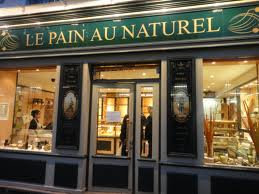The male form of the word, preservatifs, means condoms. They are available in parks and metro stations in Paris, so ubiquitous I forget they’re there except on days like today, when I pause at the turnstile to close my umbrella and find my fare. The way the dispenser is placed, right at the entrace, it appears to be related to my ride, a necessary travel item, like luggage. It makes me think of crowded rush-hour trains, commuters pressed leather jacket to leather jacket.
The female form, preservatives, is a bad word, with the same meaning as in English. My boulangerie promises that their all-natural produits contain none of these.
Then there are the other chemicals, the ones in the public service announcements for women. Yesterday, we saw one before the children’s film, Kirikou et Les Hommes et Les Femmes (Kirikou and Men and Women). It’s a sweet little-kid movie, and my fourth-grader was the oldest child in the theater. The ad showed a hold-up at a bank, with a hostage inching slowly, carefully toward her purse. We think she is going to reach for her phone and call the police, but instead she pops a pill. I thought it was a Valium, at first. But no, the punch line is: Nothing should ever get in the way of remembering to take contraceptives. Looking around the theater, I wondered who the intended audience for this message was. All the adults there, almost by definition, already had kids. Maybe it was aimed at the elementary-school set, to indoctrinate them early. My daughter’s school agenda includes helpful tips like “Going out for the weekend? Don’t forget your preservatif,” alongside others, such as “Why not have an apple for dessert today, instead of a sweet?” The French holistic approach to education. It’s only natural.

What the heck is that doing in Ella’s agenda book? Maybe it’s published as a set that’s also used by high-school students? But even so, any school administrator who let that out would be crucified in a US school system. Really interesting cultural differences.
And I’m enjoying these updates on condom terminology. You know how the Inuit have 20 different words for snow? Sounds like the same sort of thing.
So funny, John, your comment about snow!
Just to clarify: The agenda was not issued by the school. We bought it at a bookstore where the school recommended we buy our school supplies. When we showed the store our supply list, this was the agenda they recommended. There’s nothing about its packaging that implies that it’s for older kids, but it clearly must be. I don’t think in the U.S., though, that even high school kids would use agendas with tips about birth control (including: “Don’t forget the morning-after pill!”), reproductive issues being so politicized.
If preservatives, fem. means bad stuff in one’s food, does the use of the same word in the masculine imply preservation? And if so, of what? semen? of from what? paternity? disease? Must buy a french-english dictionary! By the way, what is the birthrate in France? or is the point to prevent illegitimacy, abortions, disease. Someday you will have to report how you explain all this to Ella!
The masculine noun “préservatif” comes from the verb “préserver” in the sense of protection (from disease, in this case). A preservative in food is usually referred to not as a “préservative” but as “un préservatif alimentaire.” More common is the term “conservateur” or “conservateur alimentaire.”
The birthrate in France is very slightly positive (2.01) as of 2011, according to INSEE, the national statistics institution.